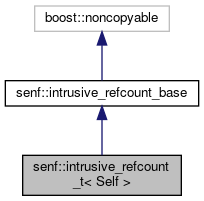senf::intrusive_refcount_t< Self > Class Template Reference
Customizable reference count mixin for intrusive_ptr. More...
#include <senf/Utils/intrusive_refcount.hh>
Inheritance diagram for senf::intrusive_refcount_t< Self >:

Protected Member Functions | |
| intrusive_refcount_t () | |
 Protected Member Functions inherited from senf::intrusive_refcount_base Protected Member Functions inherited from senf::intrusive_refcount_base | |
| intrusive_refcount_base () | |
| void | add_ref () |
| bool | release () |
Additional Inherited Members | |
 Public Types inherited from senf::intrusive_refcount_base Public Types inherited from senf::intrusive_refcount_base | |
| typedef unsigned | refcount_t |
| reference count type More... | |
 Public Member Functions inherited from senf::intrusive_refcount_base Public Member Functions inherited from senf::intrusive_refcount_base | |
| virtual | ~intrusive_refcount_base () |
| refcount_t | refcount () const |
| current refcount More... | |
| bool | is_shared () const |
return true if refcount() > 1 More... | |
Detailed Description
template<class Self>
class senf::intrusive_refcount_t< Self >
Customizable reference count mixin for intrusive_ptr.
This class provides a simple internally managed refcount and supplies the boost::intrusive_ptr required interface. To make a class compatible with boost::intrusive_ptr, just derive publicly from intrusive_refcount_t.
class SomeClass
: public intrusive_refcount_t<SomeClass>
{
// ...
private:
typedef intrusive_refcount_t<SomeClass> intrusive_base;
void add_ref()
{
// somehow call intrusive_base::add_ref()
}
bool release()
{
// Call intrusive_base::release() to decrement the
// refcount. This call will return 'true' when the refcount reaches 0.
// Return 'true', if the instance shall be deleted
}
// Needed to give intrusive_base access to 'add_ref' and 'release'
friend class intrusive_base;
};
Two additional benefits of using intrusive_refcount are
\li The object can access it's own refcount
\li It is valid and safe to convert a plain object pointer to an intrusive_ptr at any time
(not only after new)
This class allows to customize the reference counting strategy (e.g. additional refcounting
within another object or checking some additional condition before deleting the object when
the refcount reaches 0).
The interface of this class is defined in \ref intrusive_refcount_base (which you should not
use directly).
Definition at line 28 of file intrusive_refcount.hh.
Constructor & Destructor Documentation
◆ intrusive_refcount_t()
template<class Self>
|
protected |
The documentation for this class was generated from the following file: